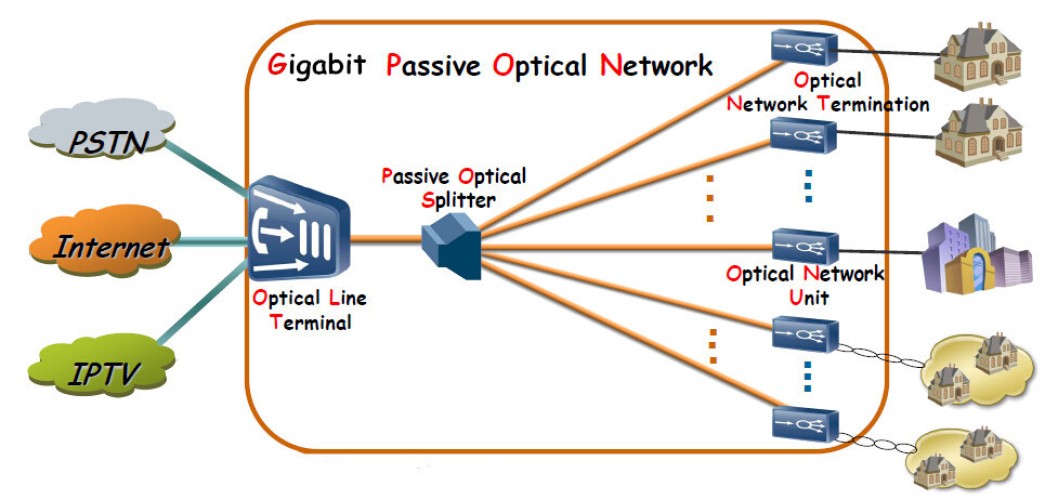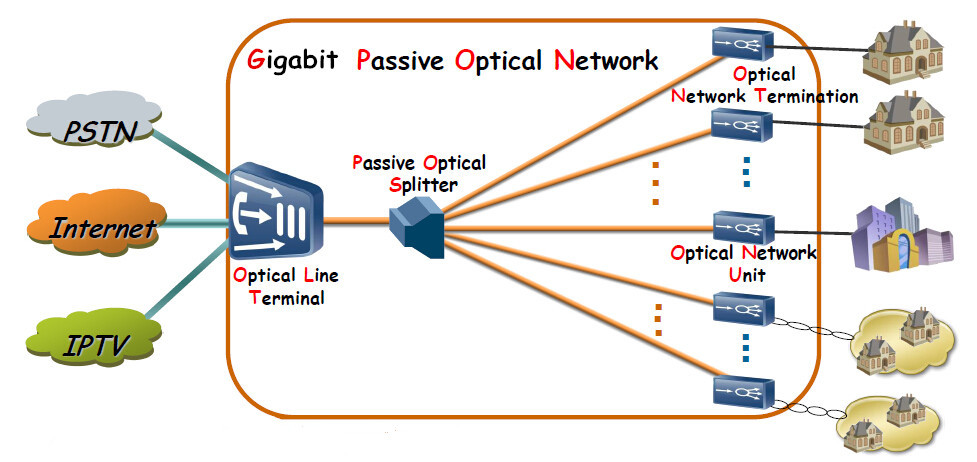
What Are GPON Networks Used For?
When it comes to internet networks, you might have heard the term "GPON" but wondered, "What are GPON networks used for?" Well, buckle up because I'm about to give you the lowdown! GPON, which stands for Gigabit Passive Optical Network, is a fancy technology used to deliver high-speed internet connections to homes, businesses, and even whole communities. It's like the highway that delivers internet magic straight to your devices!
So, what exactly is GPON and why should we care? Great questions! GPON is a type of optical fiber network that uses light signals to transmit data at lightning-fast speeds. Imagine having a superhighway exclusively for internet traffic, allowing you to stream videos, play online games, and download files in the blink of an eye. GPON makes all this possible by optimizing and maximizing the internet experience for everyone connected to the network.
But what are GPON networks used for, you ask? Well, hold tight, because the possibilities are endless! GPON networks are primarily used for delivering high-speed internet access to homes, apartments, and businesses. They provide a more reliable and efficient alternative to traditional copper-based networks, allowing for faster download and upload speeds. This means smoother video calls, seamless online gaming, and speedier downloads of your favorite movies and music. GPON networks are like the secret ingredient that makes your internet experience supercharged!
So, now that you know a bit more about GPON networks and what they're used for, get ready to unlock a whole new world of internet possibilities. With GPON, you'll be surfing the web at lightning speed, streaming your favorite shows with zero buffering, and enjoying online gaming without any lag. It's time to embrace the future of internet connectivity and experience the wonders of GPON networks!

What are GPON Networks Used For? Understanding the Applications of GPON Networks
When it comes to modern broadband connectivity, optical fiber technology has revolutionized the way we transmit data. GPON (Gigabit Passive Optical Network) is a specific type of fiber-optic technology that has gained popularity in recent years. In this article, we delve into the applications and uses of GPON networks, exploring the various industries and purposes for which they are employed. Whether you're a tech enthusiast or simply curious about the world of broadband, this comprehensive guide will take you through the fascinating realm of GPON networks.
The Broadband Revolution: How GPON Networks Have Transformed Connectivity
Gone are the days when dial-up connections were the norm and slow internet speeds were the bane of our existence. As technology has advanced, so too has our need for faster and more reliable internet solutions. GPON networks have emerged as a game-changer in the field of broadband connectivity, providing remarkable speed, capacity, and efficiency. In this section, we explore the overarching benefits and advantages of GPON networks, shedding light on why they have become the go-to solution for a wide range of industries and applications.
Healthcare Sector: Enhancing Telemedicine and Remote Patient Monitoring
The healthcare sector has experienced a revolutionary transformation with the advent of GPON networks. Telemedicine, which allows patients to consult with healthcare professionals remotely, has seen a significant surge in popularity, especially in rural or remote areas. GPON networks enable the seamless transmission of high-definition video and audio, enabling doctors to diagnose, treat, and monitor patients from a distance. Additionally, GPON networks support remote patient monitoring systems, which help healthcare providers gather real-time data and offer personalized care plans to patients with chronic conditions.
Beyond telemedicine, GPON networks also play a crucial role in medical research and education. High-speed internet connections allow medical professionals to collaborate, share information, and access online resources with ease. From virtual medical classrooms to remote surgical training, GPON networks are empowering the healthcare industry to explore new frontiers.
Overall, the adoption of GPON networks in the healthcare sector has opened up a world of possibilities, bridging geographical barriers and revolutionizing the way healthcare services are delivered.
Educational Institutions: Revolutionizing Distance Learning and Connectivity
The field of education has witnessed a transformation with the integration of GPON networks. Distance learning programs have gained immense popularity, facilitating access to quality education regardless of physical location. With GPON networks, students can attend virtual classrooms, access educational resources, and collaborate with peers and teachers seamlessly. The blazing fast speeds and reliability of GPON networks ensure a smooth and uninterrupted learning experience.
Moreover, GPON networks enable educational institutions to implement advanced technology and teaching methods. Interactive online courses, virtual laboratories, and immersive learning experiences are now within reach, enhancing the quality of education. Additionally, GPON networks facilitate efficient communication channels between students, teachers, and parents, enabling timely updates, feedback, and support.
From primary schools to universities, GPON networks have revolutionized the way education is delivered, making learning accessible to all and opening doors to a world of knowledge.
Residential Connectivity: Elevating Internet Speeds and Home Automation
In the realm of residential connectivity, GPON networks have become the go-to solution for those seeking lightning-fast internet speeds and a superior online experience. By leveraging fiber-optic technology, GPON networks provide unparalleled speeds and capacity, enabling seamless streaming, gaming, and downloading. Whether it's streaming movies in high definition or participating in online multiplayer gaming, GPON networks ensure a lag-free and immersive experience.
Furthermore, GPON networks are a boon for home automation systems. The increased bandwidth and low latency offered by GPON networks make it possible to connect and control various smart devices, from thermostats to security systems, effortlessly. This enhances home security, comfort, and energy efficiency, bringing a new level of convenience to homeowners.
With GPON networks, residential connectivity has reached new heights, transforming the way we live, work, and entertain ourselves at home.
Enterprise Solutions: Empowering Businesses and Digital Transformation
Enterprises of all sizes are leveraging the power of GPON networks to drive digital transformation and propel their businesses forward. GPON networks offer businesses reliable and high-speed internet connectivity, enabling efficient communication, seamless data transfer, and enhanced productivity.
One key application of GPON networks in the business world is cloud computing. With the ever-increasing reliance on cloud-based solutions and services, businesses need a robust and reliable internet connection. GPON networks provide the necessary infrastructure to support cloud computing, enabling businesses to access storage, software, and platforms with ease and efficiency.
Moreover, GPON networks enable businesses to embrace video conferencing and remote collaboration tools, facilitating seamless communication among teams spread across multiple locations. This not only reduces travel costs but also enhances efficiency and productivity.
From small startups to large corporations, GPON networks have become an essential tool for businesses seeking to adapt to the digital age and gain a competitive edge.
Key Takeaways: What are GPON networks used for?
- GPON networks are used for delivering high-speed internet and other services to homes and businesses.
- They use fiber optic cables to transport data over long distances at incredibly fast speeds.
- GPON networks offer better bandwidth and reliability compared to traditional copper-based networks.
- They are commonly used by internet service providers to offer services like internet, TV, and phone.
- GPON networks enable simultaneous communication between multiple users without performance degradation.
Frequently Asked Questions
GPON networks, also known as Gigabit Passive Optical Networks, are widely used in telecommunications and networking. They provide high-speed broadband connectivity and are utilized in various applications. Here are some commonly asked questions about GPON networks and their uses.
Q1: How are GPON networks used in residential settings?
A1: GPON networks are used in residential settings to deliver high-speed internet access, TV services, and voice communication. With GPON technology, multiple homes can be connected to a single optical fiber, ensuring faster speeds and efficient data transmission. This allows residents to enjoy seamless internet browsing, streaming, and video calling.
Moreover, GPON networks support symmetric bandwidth, which means that both download and upload speeds are equal. This is beneficial for activities like video conferencing, online gaming, and uploading large files.
Q2: What are the applications of GPON networks in businesses and enterprises?
A2: In businesses and enterprises, GPON networks are used to establish reliable and high-performance connectivity. They enable seamless communication between different branches, remote offices, and employees. With GPON networks, businesses can access cloud applications, VoIP services, and video conferencing, enhancing collaboration and productivity.
GPON networks also support Quality of Service (QoS) features, allowing businesses to prioritize critical applications and ensure optimal performance. This is essential for industries like healthcare, finance, and education, where real-time data transfer and high reliability are paramount.
Q3: How are GPON networks utilized in educational institutions?
A3: GPON networks play a vital role in educational institutions by providing students, teachers, and staff with fast and reliable internet connectivity. This enables seamless access to educational resources, online learning platforms, and multimedia content.
Furthermore, GPON networks in educational institutions support distance learning programs and virtual classrooms, allowing students to attend lectures remotely and interact with their peers and teachers. This is especially crucial in situations where physical attendance is not possible, such as during pandemics or natural disasters.
Q4: What are the advantages of GPON networks in healthcare facilities?
A4: GPON networks offer several advantages in healthcare facilities. They enable fast and secure transmission of medical data, including electronic health records, medical images, and real-time patient monitoring. This allows healthcare professionals to access critical information quickly, leading to improved patient care and diagnosis.
Moreover, GPON networks support telemedicine services, facilitating remote consultations and diagnostics. Patients can connect with doctors and specialists virtually, reducing the need for physical visits and improving accessibility to healthcare services, especially in rural or underserved areas.
Q5: How do GPON networks contribute to smart city initiatives?
A5: GPON networks are an integral part of smart city initiatives. They provide the backbone infrastructure for various applications, such as smart street lighting, traffic management, environmental monitoring, and public Wi-Fi access points.
By connecting different sensors and devices through GPON networks, cities can collect and analyze real-time data to optimize resources, improve public safety, and enhance the overall quality of life. GPON networks enable efficient communication between these devices, forming the foundation of a connected and intelligent city.
Summary
So, to sum it all up, GPON networks are used to provide high-speed internet and other services like phone and television. It works by using fiber optic cables to transmit data over long distances. GPON networks are able to support multiple users simultaneously, making it efficient and cost-effective. This technology is widely used in residential and commercial areas to meet the increasing demand for fast and reliable internet connections. Overall, GPON networks play a crucial role in our everyday lives by keeping us connected and enabling us to access the digital world with ease.
Recent Posts
- How Does GPON Improve Network Efficiency?
- What Are The Advantages Of GPON?
- What Are The Benefits Of IT Outsourcing?
- What's The Deal With Ransomware Attacks?
- Are GPON Providers Widely Available?
- What's GPON's Impact On Bandwidth?
- Why Is Multi-Factor Authentication Important?
- How To Ensure Data Privacy Compliance?
 Blogs
Blogs Infographics
Infographics Videos
Videos Podcasts
Podcasts Case Studies
Case Studies Call For Quote
Call For Quote